新概念英语第二册 Lesson 47 Did you want to tell me something 讲义
文档属性
| 名称 | 新概念英语第二册 Lesson 47 Did you want to tell me something 讲义 | 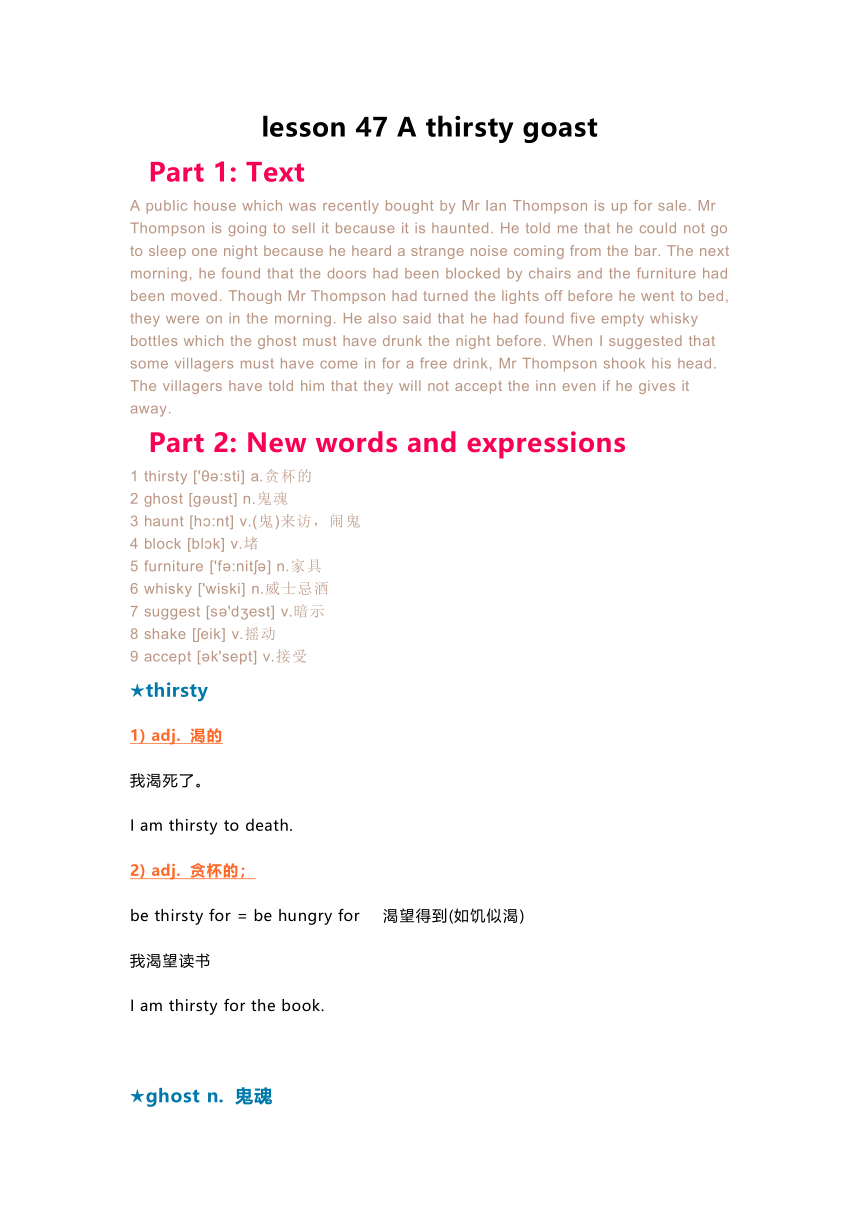 | |
| 格式 | docx | ||
| 文件大小 | 31.1KB | ||
| 资源类型 | 教案 | ||
| 版本资源 | 新概念英语 | ||
| 科目 | 英语 | ||
| 更新时间 | 2023-09-24 22:23:57 | ||
图片预览

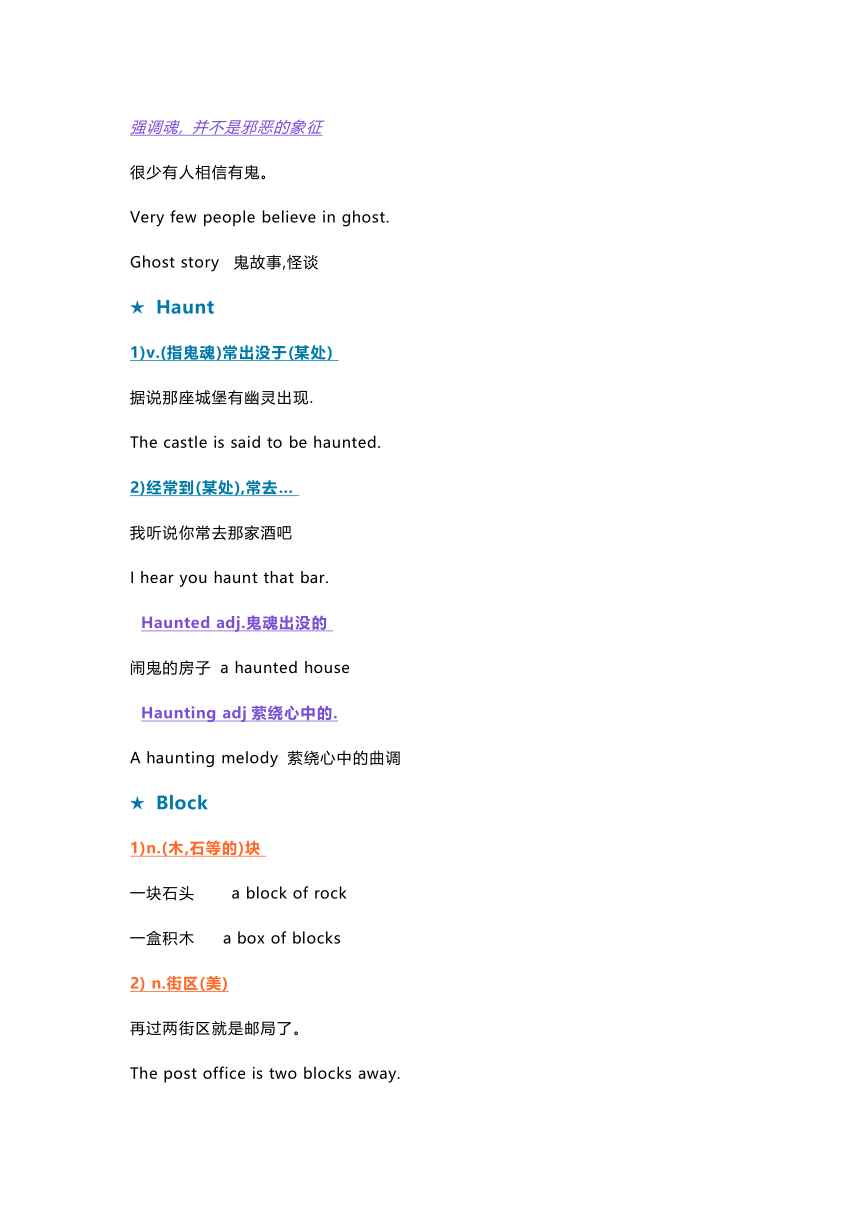
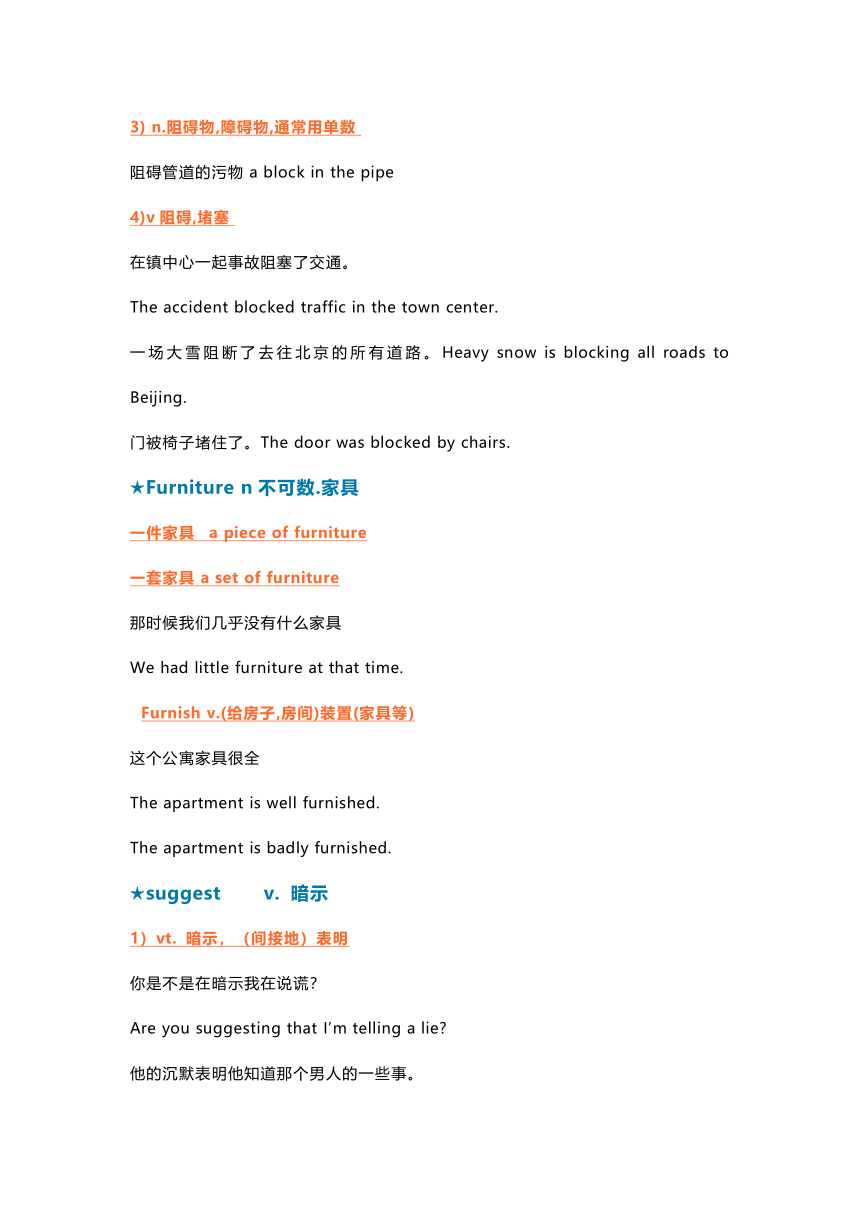
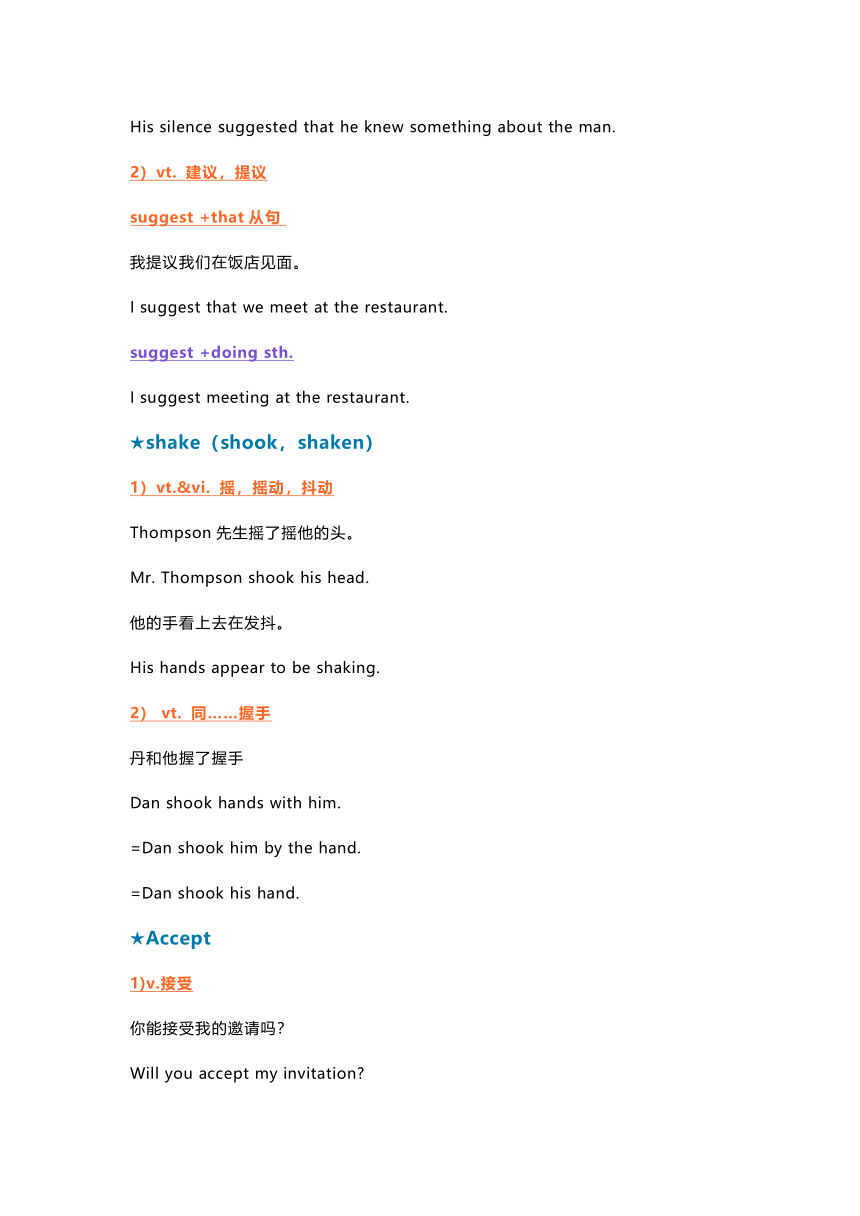
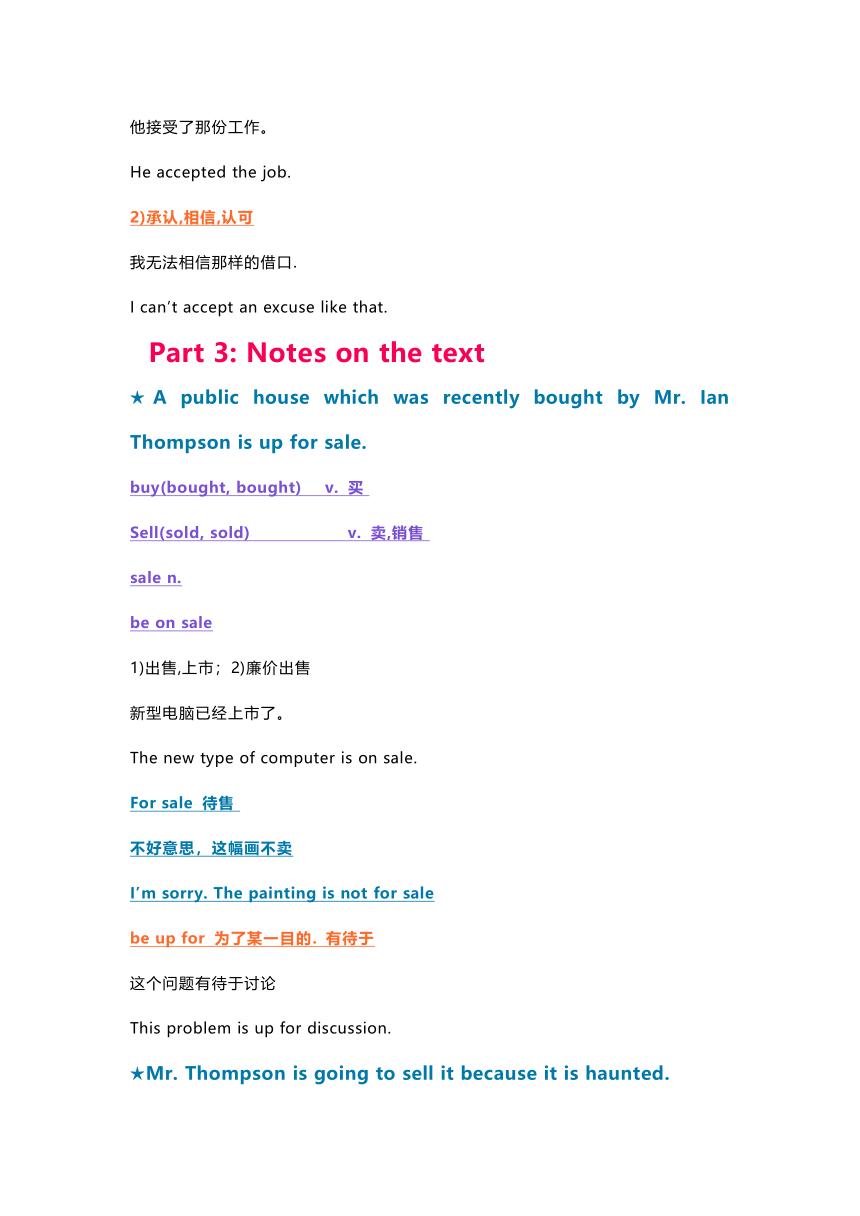
文档简介
lesson 47 A thirsty goast
Part 1: Text
A public house which was recently bought by Mr Ian Thompson is up for sale. Mr Thompson is going to sell it because it is haunted. He told me that he could not go to sleep one night because he heard a strange noise coming from the bar. The next morning, he found that the doors had been blocked by chairs and the furniture had been moved. Though Mr Thompson had turned the lights off before he went to bed, they were on in the morning. He also said that he had found five empty whisky bottles which the ghost must have drunk the night before. When I suggested that some villagers must have come in for a free drink, Mr Thompson shook his head. The villagers have told him that they will not accept the inn even if he gives it away.
Part 2: New words and expressions
1 thirsty ['θ :sti] a.贪杯的
2 ghost [g ust] n.鬼魂
3 haunt [h :nt] v.(鬼)来访,闹鬼
4 block [bl k] v.堵
5 furniture ['f :nit ] n.家具
6 whisky ['wiski] n.威士忌酒
7 suggest [s 'd est] v.暗示
8 shake [ eik] v.摇动
9 accept [ k'sept] v.接受
★thirsty
1) adj. 渴的
我渴死了。
I am thirsty to death.
2) adj. 贪杯的;
be thirsty for = be hungry for 渴望得到(如饥似渴)
我渴望读书
I am thirsty for the book.
★ghost n. 鬼魂
强调魂, 并不是邪恶的象征
很少有人相信有鬼。
Very few people believe in ghost.
Ghost story 鬼故事,怪谈
★ Haunt
1)v.(指鬼魂)常出没于(某处)
据说那座城堡有幽灵出现.
The castle is said to be haunted.
2)经常到(某处),常去…
我听说你常去那家酒吧
I hear you haunt that bar.
Haunted adj.鬼魂出没的
闹鬼的房子 a haunted house
Haunting adj萦绕心中的.
A haunting melody 萦绕心中的曲调
★ Block
1)n.(木,石等的)块
一块石头 a block of rock
一盒积木 a box of blocks
2) n.街区(美)
再过两街区就是邮局了。
The post office is two blocks away.
3) n.阻碍物,障碍物,通常用单数
阻碍管道的污物 a block in the pipe
4)v阻碍,堵塞
在镇中心一起事故阻塞了交通。
The accident blocked traffic in the town center.
一场大雪阻断了去往北京的所有道路。Heavy snow is blocking all roads to Beijing.
门被椅子堵住了。The door was blocked by chairs.
★Furniture n不可数.家具
一件家具 a piece of furniture
一套家具 a set of furniture
那时候我们几乎没有什么家具
We had little furniture at that time.
Furnish v.(给房子,房间)装置(家具等)
这个公寓家具很全
The apartment is well furnished.
The apartment is badly furnished.
★suggest v. 暗示
1)vt. 暗示,(间接地)表明
你是不是在暗示我在说谎?
Are you suggesting that I’m telling a lie
他的沉默表明他知道那个男人的一些事。
His silence suggested that he knew something about the man.
2)vt. 建议,提议
suggest +that从句
我提议我们在饭店见面。
I suggest that we meet at the restaurant.
suggest +doing sth.
I suggest meeting at the restaurant.
★shake(shook,shaken)
1)vt.&vi. 摇,摇动,抖动
Thompson先生摇了摇他的头。
Mr. Thompson shook his head.
他的手看上去在发抖。
His hands appear to be shaking.
2) vt. 同……握手
丹和他握了握手
Dan shook hands with him.
=Dan shook him by the hand.
=Dan shook his hand.
★Accept
1)v.接受
你能接受我的邀请吗?
Will you accept my invitation
他接受了那份工作。
He accepted the job.
2)承认,相信,认可
我无法相信那样的借口.
I can’t accept an excuse like that.
Part 3: Notes on the text
★A public house which was recently bought by Mr. Ian Thompson is up for sale.
buy(bought, bought) v. 买
Sell(sold, sold) v. 卖,销售
sale n.
be on sale
1)出售,上市;2)廉价出售
新型电脑已经上市了。
The new type of computer is on sale.
For sale 待售
不好意思,这幅画不卖
I’m sorry. The painting is not for sale
be up for 为了某一目的. 有待于
这个问题有待于讨论
This problem is up for discussion.
★Mr. Thompson is going to sell it because it is haunted.
be going to打算,将要
★He told me that he could not go to sleep one night because he heard a strange noise coming from the bar.
hear sb doing sth. 听见某人正在做某事
hear sb do sth. 听见某人做了某事
我听到有人正在敲门。
I heard someone knocking at the door.
昨天我听到你唱了这支歌。
I heard you sing this song yesterday.
★Though Mr. Thompson had turned the lights off before he went to bed, they were on in the morning.
Turn the lights off 关灯
turn the lights on 开灯
on为形容词,表示“开着的,接通的”,其反义词为off。
当他到家的时候,他发现所有的灯都是开着的。
When he arrived home, he found that all the lights were on.
电视开着呢吗?我以为我已经把它关了呢。Is the TV on I thought I have turned it off.
★He also said that he had found five empty whisky bottles which the ghost must have drunk the night before.
直接引语变成间接引语时,时间状语要改变。
last night 昨天晚上
the night before 前一天晚上,
★When I suggested that some villagers must have come in for a free drink, Mr. Thompson shook his head.
Must have done…表示对发生完的事情比较有把握的判断.
昨天肯定下雨了,因为马路都是湿的。
It must have rained yesterday, because the road is wet.
★When I suggested that some villagers must have come in for a free drink, Mr. Thompson shook his head.
For+n.表某人的目的
For+v.-ing 表某物的用途
他回家吃午饭 he went home for lunch
为了在家自学而买了那本书 I bought the book for studying at home.
Free免费的,不要钱的
我有几张音乐会的免费门票,你要吗?
I’ve got free tickets to the concert. Do you want one
如果你买这种威士忌,你会得到一个免费礼物:玻璃杯
you get a free gift of a glass if you buy this whiskey now
★The villagers have told him that they will not accept the pub even if he gives it away.
Even if/ even though引导让步状语从句
就算你不喜欢酒,那也得尝一杯。
Even if you don’t like wine, try a glass of this.
就算他请客,我也不会跟他一起吃饭。
I won’t have dinner with him even if he pays for it.
Give 短语
1)give away 捐献,免费的送,赠送
他把他的书都免费捐献给了图书馆。
He gave all his books away to the library.
2)Give off 散发,发出(光,烟,气味等)
这些野花散发出很香的味道。
Those wild flowers give off a nice smell.
3)Give in 屈服
妈妈屈服了,给她的孩子买了个玩具。
The mother gave in and bought a toy for her child.
4)Give out 分配,分发
当我上大学的时候,每个周六都去发传单
When I was in the university, I used to give out handbills every weekend.
5)Give up 放弃
你不应该放弃希望。
You shouldn’t give up hope.
Part 4: Grammar&Difficult points
直接引语变间接引语
1、人称的转变
1)直接引语中的第一人称一般转换为第三人称
如:He said,“I am very sorry.”
——>He said that he was very sorry.
2)直接引语中的第二人称,如果原话是针对转述人说的,转换为第一人称
如:“You should be more careful next time,” my father told me.
——> My father told me that I should be more careful the next time.
3)直接引语中的第二人称,如果原话是针对第三人称说的,转换成第三人称。
如:She said to her son, “I'll check your homework tonight.”
——> She said to her son that she would check his homework that night.
4)人称的转换包括人称代词、物主代词和名词性物主代词等,
如:He asked me, “Will you go to the station with me to meet a friend of mine this afternoon ”
——> He asked me whether I would go to the station with him to meet a friend of his that afternoon.
总之,人称的转换不是固定的,具体情况,具体对待,要符合逻辑。
2.时态的转换 直接引语改为间接引语时,主句中的谓语动词如果是过去时,从句(即间接引语部分)的谓语动词在时态方面要作相应的变化,变成过去时范畴的各种时态(实际也是宾语从句的时态要求),变化如下:
3、直接引语变成间接引语时,从句时态无须改变的情况
1)当主句的谓语动词是一般现在时的时候,
如:He always says, “I am tired out.”
——>He always says that he is tired out.
2)当主句的谓语动词是将来时的时候,
如:He will say, “I’ll try my best to help you.”
——>He will say that he will try his best to help me.
3)当直接引语部分带有具体的过去时间状语时
如:He said, “I went to college in 1994.”
——>He told us that he went to college in 1994
4)当直接引语中有以when, while引导的从句,表示过去的时间时,
如:He said,“When I was a child, I usually played football after school.”
——> He said that when he was a child, he usually played football after school.
5)当直接引语是客观真理或自然现象时,
如:Our teacher said to us, “Light travels faster than sound.”
——> Our teacher told us that light travels faster than sound.
6)当引语是谚语、格言时,
如:He said,“Practice makes perfect.” ——>He said that practice makes perfect.
7)当直接引语中有情态动词should, would, could, had better, might, must, used to, need时
如:She asked, “Must I take the medicine ”
——> She asked if she had to take the medicine.
〔注〕:此处用had to代替must更好 )此外转述中的变化要因实际情况而定,不能机械照搬,如果当地转述,here不必改为there, 动词come不必改为go,如果当天转述yesterday, tomorrow, this afternoon等均不必改变。
4、时间状语、地点状语及某些对比性的指示代词和动词变化
1)时间状语:
直接引语 (间接引语)
now (then);
today (that day);
tomorrow (the next / following day )
next week (the next / following week)
yesterday (the day before)
two days ago(two days before )
this week/month/year (that week/month/ year)
2)指示代词:these 变成those
3)地点状语:here变成there
She said, “I won't come here any more.”
——> She said that she wouldn’t go there any more.
4)动词:come变成go,bring变成take
5、直接引语变间接引语,句子结构的变化
1)陈述句。用连词that引导,that在口语中常省略。主句的谓语动词可直用接引语中的said, 也可用told来代替,注意,可以说said that, said to sb. that, told sb. that,不可直接说told that,
如:He said, “I have been to the Great Wall.”
——>He said to us that he had been to the Great Wall.
He said, “I'll give you an examination next Monday.”
——> He told us that he would give us an examination the next Monday.(不可说told that)
2)直接引语为一般疑问句,(也称是否疑问句,)间接引语用连词whether或if引导,原主句中谓语动词said要改为asked(me/him/us等),语序是陈述句的语序,这一点非常重要。
如:He said, “Do you have any difficulty with pronunciation ”
——>He asked(me)whether/if I had any difficulty with my pronunciation.
3) 直接引语为选择疑问句,间接引语用whether…or…表达,而不用if…or…,也不用either…or….
如:He asked, “Do you speak English or French ”
——> He asked me whether I spoke English or French.
4)直接引语为特殊疑问句,改成间接引语时,原来的疑问词作为间接引语的连词,主句的谓语动词用ask(sb.)来表达,语序改为陈述句语序。
如:He asked,“What's your name ”
——> He asked(me)what my name was.
5)直接引语为祈使句时,改为间接引语,用带to的不定式表达,谓语动词常是ask, advise, tell, warn, order, request等。如ask sb. to do,(由肯定祈使句变成)ask sb. not to do(由否定祈使句转变),并且在不定式短语中的时间状语、地点状语、人称及时态都作相应的变化。
如:He said,“Be seated, please.”
——> He asked us to be seated.
6)有些含有“建议”——>、“劝告”——>的祈使句,可用suggest, insist, offer等动词转述,
如:He said, “Let's have a rest.”
——> He suggested our having a rest
7)当直接引语形式上是疑问句,有表示请求,建议意义时,可用ask sb. to do sth. /suggest doing/advise sb. to do sth. 等形式转述。
如:“Would you mind opening the door ” he asked.
——>He asked me to open the door.
8)直接引语是感叹句时,变间接引语可用what或how引导,也可用that引导,
如:She said, “What a lovely day it is!”
——> She said what a lovely day it was.
或She said that it was a lovely day .
改写句子
1) The secretary asked "What's your occupation
秘书问道,你是做什么职业的
The secretary asked what my occupation was.
2) He asked :" Where are you to get off, John "
他问John你要在哪下车呢?
He asked John where he was get off.
3) He asked:' 'How are you' getting along "
他问你们相处的怎么样啊?
He asked us how we getting along
4) He asked: "Are you sure your mother will come "
他问道你确信你的母亲会来吗?
He asked me whether I was sure my mother would come.
5) He asked :"Are you a teacher or a student "
“他问道,你是老师还是学生呢?
He asked me whether I was a teacher or a student
6) "You've already got well. haven't you " she asked.
她问你已经好了,是吗?
She asked whether I had already got well.
Part 5: Homework
1.背诵lesson 47单词&课文
2.Retell the text
3.练习总结课文
Part 1: Text
A public house which was recently bought by Mr Ian Thompson is up for sale. Mr Thompson is going to sell it because it is haunted. He told me that he could not go to sleep one night because he heard a strange noise coming from the bar. The next morning, he found that the doors had been blocked by chairs and the furniture had been moved. Though Mr Thompson had turned the lights off before he went to bed, they were on in the morning. He also said that he had found five empty whisky bottles which the ghost must have drunk the night before. When I suggested that some villagers must have come in for a free drink, Mr Thompson shook his head. The villagers have told him that they will not accept the inn even if he gives it away.
Part 2: New words and expressions
1 thirsty ['θ :sti] a.贪杯的
2 ghost [g ust] n.鬼魂
3 haunt [h :nt] v.(鬼)来访,闹鬼
4 block [bl k] v.堵
5 furniture ['f :nit ] n.家具
6 whisky ['wiski] n.威士忌酒
7 suggest [s 'd est] v.暗示
8 shake [ eik] v.摇动
9 accept [ k'sept] v.接受
★thirsty
1) adj. 渴的
我渴死了。
I am thirsty to death.
2) adj. 贪杯的;
be thirsty for = be hungry for 渴望得到(如饥似渴)
我渴望读书
I am thirsty for the book.
★ghost n. 鬼魂
强调魂, 并不是邪恶的象征
很少有人相信有鬼。
Very few people believe in ghost.
Ghost story 鬼故事,怪谈
★ Haunt
1)v.(指鬼魂)常出没于(某处)
据说那座城堡有幽灵出现.
The castle is said to be haunted.
2)经常到(某处),常去…
我听说你常去那家酒吧
I hear you haunt that bar.
Haunted adj.鬼魂出没的
闹鬼的房子 a haunted house
Haunting adj萦绕心中的.
A haunting melody 萦绕心中的曲调
★ Block
1)n.(木,石等的)块
一块石头 a block of rock
一盒积木 a box of blocks
2) n.街区(美)
再过两街区就是邮局了。
The post office is two blocks away.
3) n.阻碍物,障碍物,通常用单数
阻碍管道的污物 a block in the pipe
4)v阻碍,堵塞
在镇中心一起事故阻塞了交通。
The accident blocked traffic in the town center.
一场大雪阻断了去往北京的所有道路。Heavy snow is blocking all roads to Beijing.
门被椅子堵住了。The door was blocked by chairs.
★Furniture n不可数.家具
一件家具 a piece of furniture
一套家具 a set of furniture
那时候我们几乎没有什么家具
We had little furniture at that time.
Furnish v.(给房子,房间)装置(家具等)
这个公寓家具很全
The apartment is well furnished.
The apartment is badly furnished.
★suggest v. 暗示
1)vt. 暗示,(间接地)表明
你是不是在暗示我在说谎?
Are you suggesting that I’m telling a lie
他的沉默表明他知道那个男人的一些事。
His silence suggested that he knew something about the man.
2)vt. 建议,提议
suggest +that从句
我提议我们在饭店见面。
I suggest that we meet at the restaurant.
suggest +doing sth.
I suggest meeting at the restaurant.
★shake(shook,shaken)
1)vt.&vi. 摇,摇动,抖动
Thompson先生摇了摇他的头。
Mr. Thompson shook his head.
他的手看上去在发抖。
His hands appear to be shaking.
2) vt. 同……握手
丹和他握了握手
Dan shook hands with him.
=Dan shook him by the hand.
=Dan shook his hand.
★Accept
1)v.接受
你能接受我的邀请吗?
Will you accept my invitation
他接受了那份工作。
He accepted the job.
2)承认,相信,认可
我无法相信那样的借口.
I can’t accept an excuse like that.
Part 3: Notes on the text
★A public house which was recently bought by Mr. Ian Thompson is up for sale.
buy(bought, bought) v. 买
Sell(sold, sold) v. 卖,销售
sale n.
be on sale
1)出售,上市;2)廉价出售
新型电脑已经上市了。
The new type of computer is on sale.
For sale 待售
不好意思,这幅画不卖
I’m sorry. The painting is not for sale
be up for 为了某一目的. 有待于
这个问题有待于讨论
This problem is up for discussion.
★Mr. Thompson is going to sell it because it is haunted.
be going to打算,将要
★He told me that he could not go to sleep one night because he heard a strange noise coming from the bar.
hear sb doing sth. 听见某人正在做某事
hear sb do sth. 听见某人做了某事
我听到有人正在敲门。
I heard someone knocking at the door.
昨天我听到你唱了这支歌。
I heard you sing this song yesterday.
★Though Mr. Thompson had turned the lights off before he went to bed, they were on in the morning.
Turn the lights off 关灯
turn the lights on 开灯
on为形容词,表示“开着的,接通的”,其反义词为off。
当他到家的时候,他发现所有的灯都是开着的。
When he arrived home, he found that all the lights were on.
电视开着呢吗?我以为我已经把它关了呢。Is the TV on I thought I have turned it off.
★He also said that he had found five empty whisky bottles which the ghost must have drunk the night before.
直接引语变成间接引语时,时间状语要改变。
last night 昨天晚上
the night before 前一天晚上,
★When I suggested that some villagers must have come in for a free drink, Mr. Thompson shook his head.
Must have done…表示对发生完的事情比较有把握的判断.
昨天肯定下雨了,因为马路都是湿的。
It must have rained yesterday, because the road is wet.
★When I suggested that some villagers must have come in for a free drink, Mr. Thompson shook his head.
For+n.表某人的目的
For+v.-ing 表某物的用途
他回家吃午饭 he went home for lunch
为了在家自学而买了那本书 I bought the book for studying at home.
Free免费的,不要钱的
我有几张音乐会的免费门票,你要吗?
I’ve got free tickets to the concert. Do you want one
如果你买这种威士忌,你会得到一个免费礼物:玻璃杯
you get a free gift of a glass if you buy this whiskey now
★The villagers have told him that they will not accept the pub even if he gives it away.
Even if/ even though引导让步状语从句
就算你不喜欢酒,那也得尝一杯。
Even if you don’t like wine, try a glass of this.
就算他请客,我也不会跟他一起吃饭。
I won’t have dinner with him even if he pays for it.
Give 短语
1)give away 捐献,免费的送,赠送
他把他的书都免费捐献给了图书馆。
He gave all his books away to the library.
2)Give off 散发,发出(光,烟,气味等)
这些野花散发出很香的味道。
Those wild flowers give off a nice smell.
3)Give in 屈服
妈妈屈服了,给她的孩子买了个玩具。
The mother gave in and bought a toy for her child.
4)Give out 分配,分发
当我上大学的时候,每个周六都去发传单
When I was in the university, I used to give out handbills every weekend.
5)Give up 放弃
你不应该放弃希望。
You shouldn’t give up hope.
Part 4: Grammar&Difficult points
直接引语变间接引语
1、人称的转变
1)直接引语中的第一人称一般转换为第三人称
如:He said,“I am very sorry.”
——>He said that he was very sorry.
2)直接引语中的第二人称,如果原话是针对转述人说的,转换为第一人称
如:“You should be more careful next time,” my father told me.
——> My father told me that I should be more careful the next time.
3)直接引语中的第二人称,如果原话是针对第三人称说的,转换成第三人称。
如:She said to her son, “I'll check your homework tonight.”
——> She said to her son that she would check his homework that night.
4)人称的转换包括人称代词、物主代词和名词性物主代词等,
如:He asked me, “Will you go to the station with me to meet a friend of mine this afternoon ”
——> He asked me whether I would go to the station with him to meet a friend of his that afternoon.
总之,人称的转换不是固定的,具体情况,具体对待,要符合逻辑。
2.时态的转换 直接引语改为间接引语时,主句中的谓语动词如果是过去时,从句(即间接引语部分)的谓语动词在时态方面要作相应的变化,变成过去时范畴的各种时态(实际也是宾语从句的时态要求),变化如下:
3、直接引语变成间接引语时,从句时态无须改变的情况
1)当主句的谓语动词是一般现在时的时候,
如:He always says, “I am tired out.”
——>He always says that he is tired out.
2)当主句的谓语动词是将来时的时候,
如:He will say, “I’ll try my best to help you.”
——>He will say that he will try his best to help me.
3)当直接引语部分带有具体的过去时间状语时
如:He said, “I went to college in 1994.”
——>He told us that he went to college in 1994
4)当直接引语中有以when, while引导的从句,表示过去的时间时,
如:He said,“When I was a child, I usually played football after school.”
——> He said that when he was a child, he usually played football after school.
5)当直接引语是客观真理或自然现象时,
如:Our teacher said to us, “Light travels faster than sound.”
——> Our teacher told us that light travels faster than sound.
6)当引语是谚语、格言时,
如:He said,“Practice makes perfect.” ——>He said that practice makes perfect.
7)当直接引语中有情态动词should, would, could, had better, might, must, used to, need时
如:She asked, “Must I take the medicine ”
——> She asked if she had to take the medicine.
〔注〕:此处用had to代替must更好 )此外转述中的变化要因实际情况而定,不能机械照搬,如果当地转述,here不必改为there, 动词come不必改为go,如果当天转述yesterday, tomorrow, this afternoon等均不必改变。
4、时间状语、地点状语及某些对比性的指示代词和动词变化
1)时间状语:
直接引语 (间接引语)
now (then);
today (that day);
tomorrow (the next / following day )
next week (the next / following week)
yesterday (the day before)
two days ago(two days before )
this week/month/year (that week/month/ year)
2)指示代词:these 变成those
3)地点状语:here变成there
She said, “I won't come here any more.”
——> She said that she wouldn’t go there any more.
4)动词:come变成go,bring变成take
5、直接引语变间接引语,句子结构的变化
1)陈述句。用连词that引导,that在口语中常省略。主句的谓语动词可直用接引语中的said, 也可用told来代替,注意,可以说said that, said to sb. that, told sb. that,不可直接说told that,
如:He said, “I have been to the Great Wall.”
——>He said to us that he had been to the Great Wall.
He said, “I'll give you an examination next Monday.”
——> He told us that he would give us an examination the next Monday.(不可说told that)
2)直接引语为一般疑问句,(也称是否疑问句,)间接引语用连词whether或if引导,原主句中谓语动词said要改为asked(me/him/us等),语序是陈述句的语序,这一点非常重要。
如:He said, “Do you have any difficulty with pronunciation ”
——>He asked(me)whether/if I had any difficulty with my pronunciation.
3) 直接引语为选择疑问句,间接引语用whether…or…表达,而不用if…or…,也不用either…or….
如:He asked, “Do you speak English or French ”
——> He asked me whether I spoke English or French.
4)直接引语为特殊疑问句,改成间接引语时,原来的疑问词作为间接引语的连词,主句的谓语动词用ask(sb.)来表达,语序改为陈述句语序。
如:He asked,“What's your name ”
——> He asked(me)what my name was.
5)直接引语为祈使句时,改为间接引语,用带to的不定式表达,谓语动词常是ask, advise, tell, warn, order, request等。如ask sb. to do,(由肯定祈使句变成)ask sb. not to do(由否定祈使句转变),并且在不定式短语中的时间状语、地点状语、人称及时态都作相应的变化。
如:He said,“Be seated, please.”
——> He asked us to be seated.
6)有些含有“建议”——>、“劝告”——>的祈使句,可用suggest, insist, offer等动词转述,
如:He said, “Let's have a rest.”
——> He suggested our having a rest
7)当直接引语形式上是疑问句,有表示请求,建议意义时,可用ask sb. to do sth. /suggest doing/advise sb. to do sth. 等形式转述。
如:“Would you mind opening the door ” he asked.
——>He asked me to open the door.
8)直接引语是感叹句时,变间接引语可用what或how引导,也可用that引导,
如:She said, “What a lovely day it is!”
——> She said what a lovely day it was.
或She said that it was a lovely day .
改写句子
1) The secretary asked "What's your occupation
秘书问道,你是做什么职业的
The secretary asked what my occupation was.
2) He asked :" Where are you to get off, John "
他问John你要在哪下车呢?
He asked John where he was get off.
3) He asked:' 'How are you' getting along "
他问你们相处的怎么样啊?
He asked us how we getting along
4) He asked: "Are you sure your mother will come "
他问道你确信你的母亲会来吗?
He asked me whether I was sure my mother would come.
5) He asked :"Are you a teacher or a student "
“他问道,你是老师还是学生呢?
He asked me whether I was a teacher or a student
6) "You've already got well. haven't you " she asked.
她问你已经好了,是吗?
She asked whether I had already got well.
Part 5: Homework
1.背诵lesson 47单词&课文
2.Retell the text
3.练习总结课文
同课章节目录
